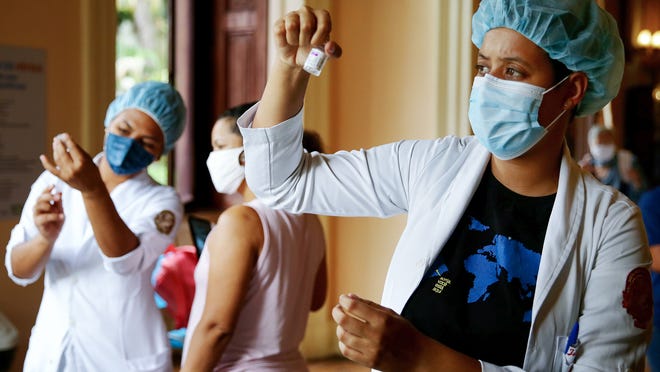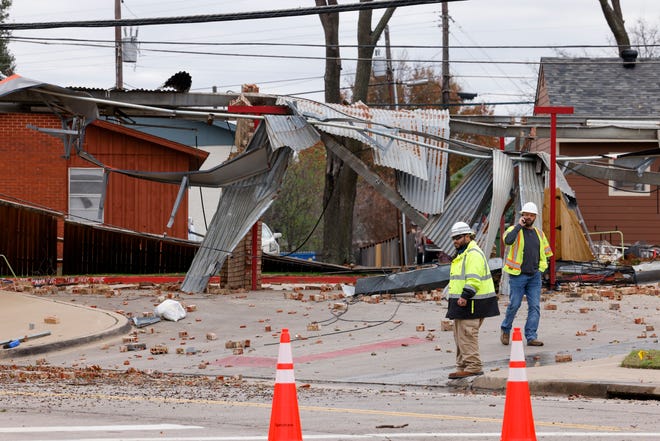
Concern about thehighly transmissible delta COVID-19 variant and its spread among the unvaccinated continues to grow as U.S. cases rise, but positive news about vaccines' ability to fight the virus keeps coming.
On Thursday, Johnson & Johnson said its one-dose shot protects against the delta variant, citing lab tests of vaccine recipients' blood. And amid concern that their shot might require a booster, the company said its immune response lasts eight months and counting.
But public health experts say the variant poses the most danger in regions where vaccinations are sparse.
The variants “are able to find any gaps in our protection,” Dr. Hilary Babcock of Washington University at St. Louis said, pointing to how hospital beds and intensive care units in Missouri’s least-vaccinated southwestern counties suddenly are filling — mostly with adults under 40 who never received the shots.
“Any suffering or death from COVID-19 is tragic," Dr. Rochelle Walensky, director of the Centers for Disease Control and Prevention, said Thursday in urging more Americans to roll up their sleeves ahead of the delta variant's spread. "With vaccines available across the country, the suffering and loss we are now seeing is nearly entirely avoidable."
Also in the news:
►Even as Californians seek a return to normal, the specter of the coronavirus pandemic lingers. New cases of COVID-19 in the state and the Bay Area have jumped more than 20% since California's June 15 reopening, according to the San Francisco Chronicle.
►Preliminary data reviewed by the CDC suggests nearly all the people who died from COVID-19 over the past six months were unvaccinated, Walensky said during a Thursday White House briefing.
►Ohio Gov. Mike DeWine vetoed a budget provision that would have refunded fines to state businesses cited for violating public health orders during the pandemic, saying that would send a "horrible" message.
►Thailand reopened its popular resort island, Phuket, to fully vaccinated foreigners from lower-risk countries Thursday, with hopes the move will breathe new life into a tourism industry devastated by the pandemic.
►Israel has pushed back the reopening of its borders to vaccinated visitors to Aug. 1, after the country reported its highest daily infection rate in three months.
?Today's numbers: The U.S. has more than 33.6 million confirmed COVID-19 cases and at least 605,000 deaths, according to Johns Hopkins University data. The global totals: More than 182 million cases and more than 3.9 million deaths. More than 155.8 million Americans have been fully vaccinated – 47% of the population, according to the CDC.
?What we're reading: Florida schools lost migrant students at a rate nearly five times higher than the non-migrant population during the 2020-2021 school year. Virtual learning, economic trials and high COVID-19 rates in farmworker communities magnified inequities for students already prone to learning loss.
Keep refreshing this page for the latest news. Want more? Sign up for our Coronavirus Watch newsletter for updates to your inbox and join our Facebook group.
Fourth of July raises worries in Missouri
Health officials working to boost lagging COVID-19 vaccination rates in Missouri are growing anxious as the Fourth of July weekend approaches, creating ripe conditions for the fast-spreading delta variant to send hospital numbers climbing.
“We are just kind of keeping an eye to see what is going to happen," said Lisa Marshall, the health director for Taney County, which includes the tourist town of Branson. “We’ve seen that these numbers can jump pretty quickly."
State officials have requested aid from newly formed federal “surge response teams.” The push comes as the state's seven-day rolling average of daily new cases has risen over the past two weeks from 576.14 new cases per day on June 15 to 891.71 new cases per day on Tuesday, according to data from Johns Hopkins University.
Health officials in St. Louis County shifted their guidance Thursday, encouraging vaccinated people to wear face coverings when indoors with others whose vaccination status is unknown.
“This pandemic is not over,” said Dr. Faisal Khan, acting director of the St. Louis County Department of Public Health, told the Associated Press. “The virus and its variants present a real and imminent danger to the health of people in the St. Louis region. We must encourage vaccination and continued precautions.”
Daily cases 10% higher in United States this week
New cases of COVID-19 are on the rise compared to last week as the delta variant spreads throughout the U.S., health officials said Thursday.
The weekly average of new daily cases was 10% higher, even though cases were down 95% from the nation's peak in January, Dr. Rochelle Walensky, director of the CDC, said in a briefing.
The delta variant, which is thought to be more contagious, is the second-most prevalent variant circulating in the U.S. and is expected to become the most common "in the coming weeks," Walensky said.
"As we prepare for Independence Day, I want to remind those who remain unvaccinated to protect themselves by wearing a mask, and avoid crowds to prevent transmission and illness," she said.
— Grace Hauck
WHO pushes Western countries to accept travelers with Chinese vaccines
The World Health Organization said Thursday that any COVID-19 vaccine it has authorized for emergency use should be recognized by countries as they open up their borders to inoculated travelers.
The move could challenge Western countries to broaden their acceptance of two apparently less effective Chinese vaccines made by Sinovac and Sinopharm, which the U.N. health agency has licensed but most European and North American countries have not.
In its reviews of the two Chinese vaccines, WHO said both were found to significantly reduce the risk of hospitalizations and deaths. The two Chinese shots are “inactivated” vaccines, made with killed coronavirus, whereas the Western-made shots are made with newer technologies that instead target the “spike” protein that coats the surface of the coronavirus.
Although Western countries have largely relied on vaccines made in the U.S. and Europe, such as Pfizer and AstraZeneca, many developing countries have used the Chinese-made shots.
Contributing: Associated Press
Source link








